I like moving on natural surfaces if possible, although the improved trail is preferred when there has been heavy rain that makes the natural path muddy.
This blog is meant to be a companion to my kayaking blog (Kayaking the Lakes of South Dakota) and features the parks and nature areas in the city and area surrounding Sioux Falls, South Dakota. The blog should be considered as an annotated inventory of the parks and recreation areas in the Sioux Falls area and presented from my personal perspective.
Exploring the Parks and Nature Areas Around Sioux Falls
Sioux Falls has 76 named parks throughout the city that range from small sites suitable for neighborhood gatherings and playgrounds to large well developed nature centers such as Great Bear Recreational Park, Arrowhead Park, the Wegner Arboretum and East Sioux Falls Historical Site, and the linked park system along the Big Sioux River. The state provides outdoor recreation areas and state parks including the Big Sioux Recreation Area, Beaver Creek Nature Area, Lake Alvin Recreation Area, Newton Hills State Park, and the Outdoor Campus in Sioux Falls that is a joint city/state operation.
Sunday, April 22, 2012
Great Bear: The Lower Trail and Up on the Ski Lift Hill
I like moving on natural surfaces if possible, although the improved trail is preferred when there has been heavy rain that makes the natural path muddy.
Wednesday, April 11, 2012
Dewey C. Gevik Outdoor Conservation Area
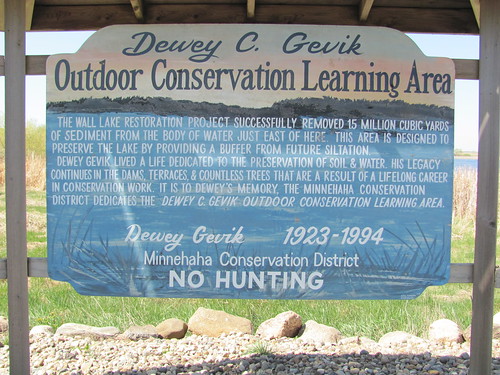
The Sioux Falls Argus Leader ran a story in their “Go Outdoors” section on Friday, April 6, 2012 featuring birding opportunities in the area, and one of the sites highlighted in that extensive article described the Dewey C. Gevik Outdoor Conservation Learning Area, a facility that was totally unknown to me. The following language is from the website describing this nature area (http://www.leifericson.org/sfbc/id22.html):
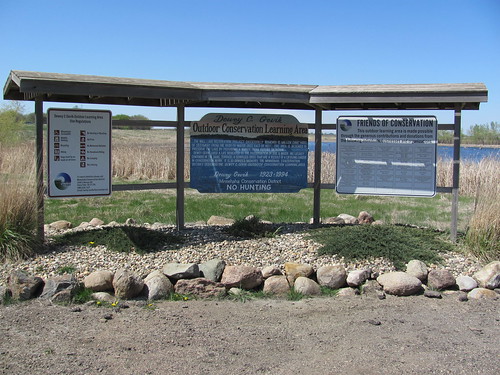
“The Dewey C. Gevik Outdoor Conservation Learning Area consists of an area of 100 acres, managed by the Minnehaha Conservation District. It includes native prairie grass plantings, shelterbelt and wildlife tree plantings, volunteer native trees, and wetlands. The trail system offers access to all the diverse environments and includes observation areas to watch wildlife.”
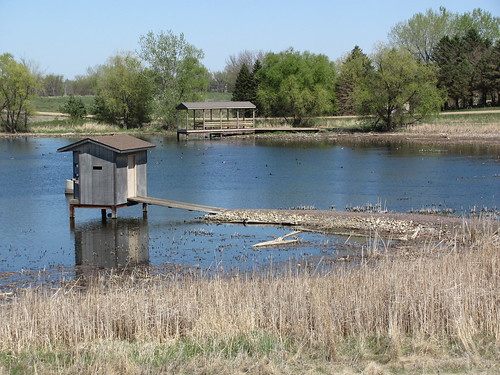
“For birding purposes, it offers areas for prairie, wetland, nesting, and migrating species, with access and observation areas for short of long-term observation. It is rare to find an area dedicated to nature that is wildlife friendly, does not allow any hunting or trapping, and will be taken care of for future generations.”
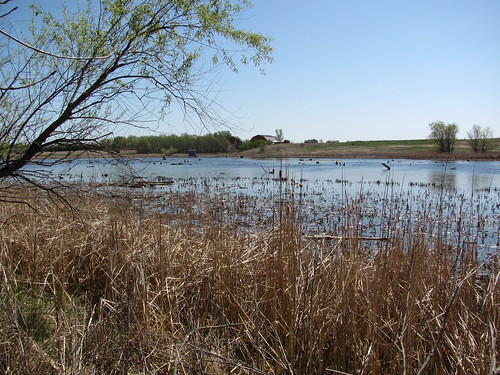
Today, my wife and I decided to drive out to see the site and stroll along the trails. The learning center is located west of Sioux Falls; driving west along Highway 42 (12th Street), we continued past the Wall Lake turnoff, just past the Wall Lake gas station, to the first through gravel road and turned south for about one mile. The learning center is along the right side of the gravel road, just across from a long line of mailboxes and is clearly visible with a large sign and parking area.
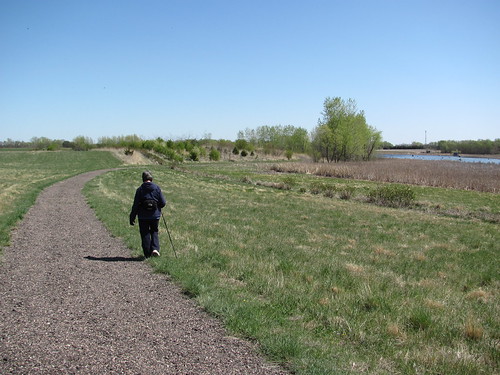
The central feature of the site is a large pond with adjoining wetlands, a crushed asphalt hiking trail that circles around the pond and through the prairie, and a set of three observation structures. There is also a set of vault toilets just off the parking lot.
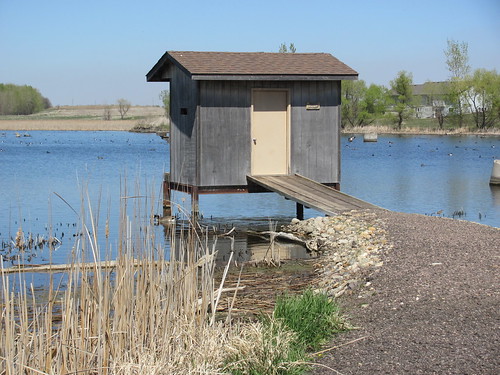
We passed through a gate and entered the trail that circles the area along the pond. Our first stop was an observation blind that is built upon a pier out into the wetlands. The blind has slit windows and a bench.
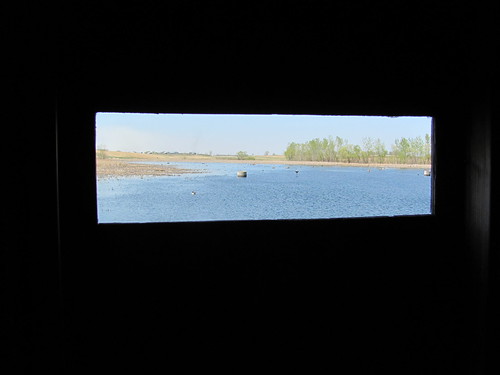
After sitting there for a few minutes, the bird life that had been disturbed through our presence resumed its activity. There was a large number of waterfowl visible, mostly ducks and geese.
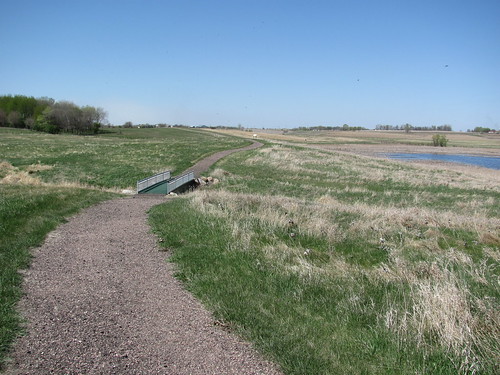
On the website, there are 55 bird species listed that can be found at this site.
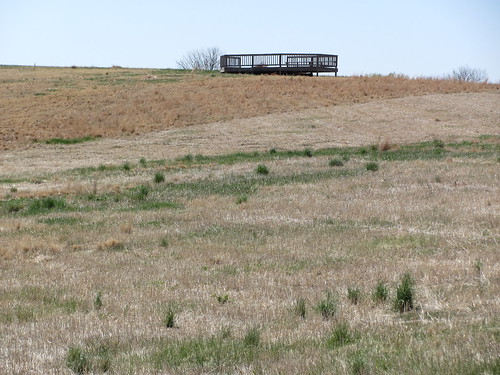
Continuing on our hike along the trail, we moved to the far end of the pond and up on a rise where a bandstand-like structure had been built to afford a commanding view over the landscape.

The trail then continued along the far end of the pond and on to the other side. The trail forked, one end moving along through a shelterbelt at the water’s edge and the other along an elevation overlooking the landscape from another vantage point.
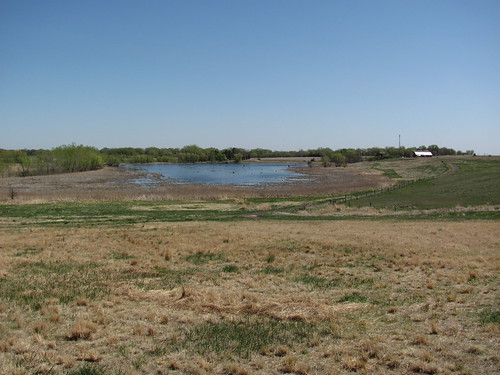
As we took the water’s edge trail, I moved through the trees to more closely observe the waterfowl cruising about.
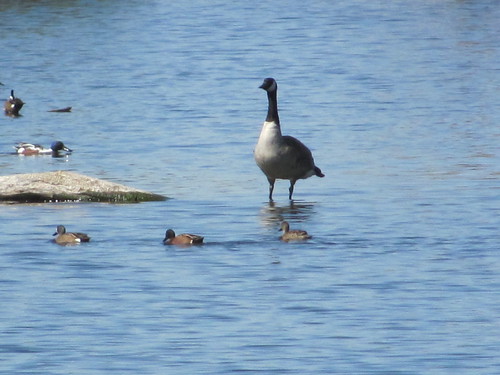
While the trail is developed in a loop form, the loop is not closed. In the end, the hiker must return along the same pathway, although there is both a lower and an upper element of that trail.

By the time we had returned to the gate at the parking lot, we had walked about an hour and fifteen minutes. The trail is very well developed and it does not present any hiking challenge. There is interpretive signage located throughout the site. The point of the hike is to observe the prairie grasses and trees and the pond life, especially the avian population.
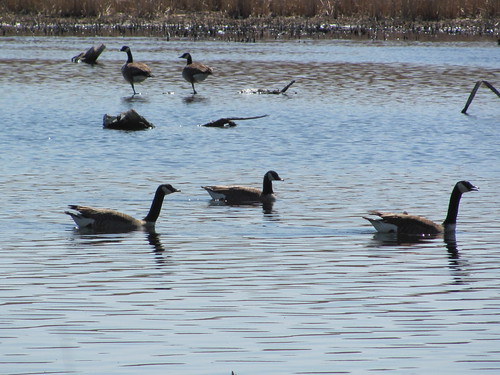
From the parking lot, we walked over to another covered structure with benches and built on a pier over the wetlands. It seems designed for groups to attend to a guide pointing out features of the site. For us, though, it was a pleasant spot to sit back in the sun and watch the bird life.
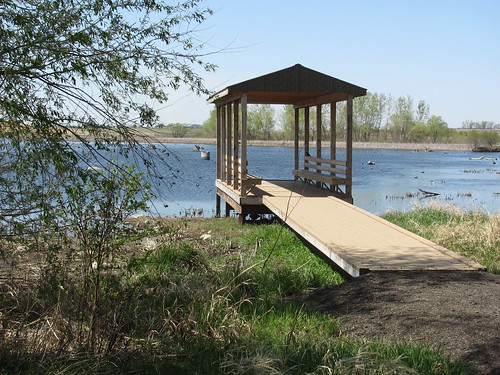
The Gevik learning area is a very pleasant spot just west of Sioux Falls. It seems a wonderful spot for a contemplative stroll through the prairie and along the shoreline of this large pond. This nature area is just on the west end of Wall Lake, so there are a number of residences visible in the near distance. It is fairly close to Sioux Falls, especially to those who live on the west side of the city. We will come back to this site over the coming seasons to observe the changing conditions. For people really interested in bird watching, this seems like one of the premier settings in the area.
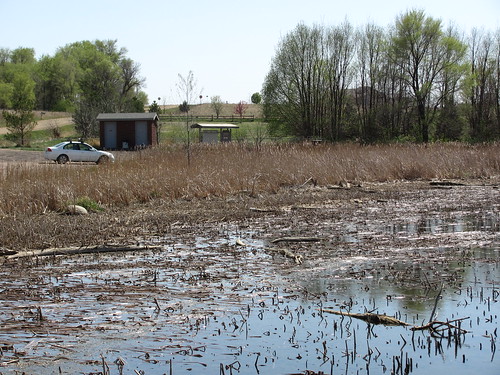
I read about another nature center along the same road but on the north end, north of Highway 42. On the way home, we continued along that road, past Highway 42, for another mile to the Makoce Washte Native Prairie. This is a parcel of land owned by the Nature Conservancy. We looked but were unable to find an entrance or anything resembling a hiking trail.













